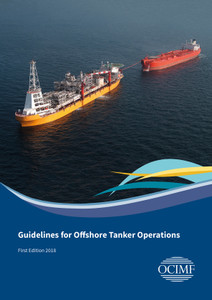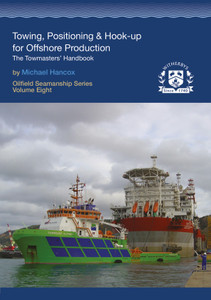
The OCIMF Offshore Vessel Management and Self Assessment (OVMSA) programme is a tool to help companies operating offshore vessels assess, measure and improve their management systems. These systems encompass all company activities, including technical, operational, personnel and Health, Safety, Security and Environment (HSSE), both on board and ashore.
By
aligning
their
own
policies
and
procedures
with
guidance
detailed
in
this
programme,
companies
can
improve
their
performance
and
attain
high
standards
of
safety
and
pollution
prevention.
Self
assessment
results
inform
the
strategy
of
shipboard
personnel
as
they
improve
their
safety
management
systems.
This
second
edition
has
been
updated
to
reflect
current
legislation,
expectations
and
emerging
issues.
It
contains
thirteen
elements,
the
latest
addition
detailing
maritime
security
considerations.
Its
update
reflects
feedback
from
companies,
industry
bodies
and
users
of
OVMSA.
The OCIMF Offshore Vessel Management and Self Assessment (OVMSA) programme was introduced in 2012 as a tool to help companies operating offshore vessels to assess, measure and improve their management systems. These systems encompass all company activities, including technical, operational, personnel and Health, Safety, Security and Environment (HSSE), both on board and ashore. The range of different offshore vessels and units are commonly referred to as vessels throughout this guide.
This second edition has been updated to reflect current legislation, expectations and emerging issues, and reflects feedback from companies, industry bodies and users of OVMSA.
The programme encourages companies to assess their management systems against Key Performance Indicators (KPIs) and provides a minimum expectation (level 1), plus three levels of increasing best practice guidance. Self assessment results can be used to develop phased improvement plans that support continuous improvement of their safety management systems. Companies are encouraged to regularly review their self assessment results against the OVMSA KPIs and to create achievable plans for improvement.
Aligning their own policies and procedures with industry best practice helps companies to improve their performance and attain high standards of safety and pollution prevention.
While the OVMSA programme provides guidance, responsibility for vessel operations, and distribution of this data, lies exclusively with the vessel operator. It is recognised that non-SOLAS vessels operate outside the International Safety Management (ISM) Code. However, operators of such vessels can use this guide as a tool to measure and improve their operations. A company that incorporates the OVMSA into its management system will likely have an active assessment process, even if it does not have an ISM-approved system. Vessel operators can conduct, and regularly review, their OVMSA assessments online at
www.ocimf.org/ovid. Usernames and passwords are issued by OCIMF for a nominal software licence fee.
The OVMSA programme will continue to evolve. New KPIs may be added and best practice guidance updated in future editions.
As part of OCIMF’s goal to continually improve OVMSA, we invite comment and feedback from vessel operators and other interested parties, particularly on what constitutes best practice. Please send any comments to enquiries@ocimf.org.
Glossary
Abbreviations
Section one The Offshore Vessel Management and Assessment Programme
1.1 Introduction
1.2 Continual improvement
1.3 Key performance indicators
1.4 Self assessment process
1.5 Verification process
1.6 Submitting reports
Section two The 13 Elements of the OVMSA Guidelines
Element one Leadership and the Safety Management System
1 Management, leadership and accountability
1A Developing and maintaining a Safety Management System
Element two Recruitment and management of shore-based personnel
Element three Recruitment, management and wellbeing of vessel personnel
3 Recruitment and management of vessel personnel
3A Wellbeing of vessel personnel
Element four Vessel reliability and maintenance, including critical equipment
4 Vessel reliability and maintenance
4A Vessel reliability and maintenance (critical equipment)
Element five Navigational safety
Element six Offshore operations and the management of contractors
6A Offshore operations – Mooring
6B Offshore operations – Safe access
6C Offshore operations – Cargo, bunkering, ballasting and stability
6D Offshore operations – Lifting and hoisting
6E Offshore operations – Management of contractors
6F Specialist activities – Dynamic Positioning (DP) operations
6G Specialist activities – Anchor Handling and Towing (AHT)
6H Specialist activities – Geophysical and geotechnical
6I Specialist activities – Heavy lift
Element seven Management of change
Element eight Incident reporting, investigation and analysis
Element nine Safety management
9 Safety management: shore-based monitoring
9A Safety management: fleet monitoring
Element ten Environmental and energy management
Element eleven Emergency preparedness and contingency planning
Element twelve Measurement, analysis and improvement
12 Measurement, analysis and improvement (inspections)
12A Measurement, analysis and improvement (audits)
Element thirteen Maritime security
OCIMF
The Oil Companies International Marine Forum (OCIMF) is a voluntary association of oil companies with an interest in the shipment and terminalling of crude oil, oil products, petrochemicals and gas. OCIMF focuses exclusively on preventing harm to people and the environment by promoting best practice in the design, construction and operation of tankers, barges and offshore vessels and their interfaces with terminals. Learn more at www.ocimf.org
- Number of Pages:
- 80
- ISBN:
- 9781856098465
- Binding Format:
- Hardback
- Book Height:
- 300 mm
- Book Width:
- 215 mm
- Weight:
- 0.9 kg
- Author:
OCIMF
- Published Date:
- December 2019
- Preview:
- Yes
 Witherbys.com
Witherbys.com





